Ensemble 20/21 Presents “Music of the Earth,” Part of Curtis’s All-School Project

Press Contacts:
Patricia K. Johnson | patricia.johnson@curtis.edu | (215) 717-3190
Ryan Scott Lathan | ryan.lathan@curtis.edu | (215) 717-3145
Download PDF
PHILADELPHIA, PA—November 1, 2023—Ensemble 20/21, the cutting-edge contemporary music ensemble of the Curtis Institute of Music, kicks off its dynamic 2023–24 season on Saturday, November 18, 2023, at 7:30 p.m., in Gould Rehearsal Hall with “Music of the Earth.” This inspiring concert celebrates the wonder, complexity, and awe-inspiring grandeur of the natural world with five innovative compositions by prolific living composers John Luther Adams, Raven Chacon, Allison Loggins-Hull, Curtis alumna Gabriella Smith (’13), and Gulli Björnsson, presented alongside an influential work by twentieth-century electronic music legend, Luciano Berio. Featuring the talents of Curtis’s extraordinarily gifted students under the baton of Micah Gleason, the Rita E. Hauser Conducting Fellow, this thoughtfully curated program endeavors to spark environmental action and encourage an eco-conscious mindset from its audience.
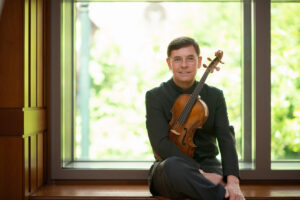 Ensemble 20/21’s highly anticipated season opener is part of Curtis’s All-School Project—aligning classroom learning, thinking, and writing with performance activities, inviting students to explore one common theme from different angles. This year’s theme examines “the music that emanates from the earth and its inhabitants,” to provide a framework for understanding issues of climate change, sustainability of natural resources, and global justice. Curtis President and CEO Roberto Díaz first envisioned and realized the All-School Project during the 2007–08 school year with the Opus 95 Project, which focused on Ludwig van Beethoven’s string quartet masterwork. This inaugural project received praise from the New York Times for its innovation and inspired a yearly tradition at Curtis, culminating in impactful topics over recent academic years, including an initiative focused on the civil rights movement and “Music of Change.”
Ensemble 20/21’s highly anticipated season opener is part of Curtis’s All-School Project—aligning classroom learning, thinking, and writing with performance activities, inviting students to explore one common theme from different angles. This year’s theme examines “the music that emanates from the earth and its inhabitants,” to provide a framework for understanding issues of climate change, sustainability of natural resources, and global justice. Curtis President and CEO Roberto Díaz first envisioned and realized the All-School Project during the 2007–08 school year with the Opus 95 Project, which focused on Ludwig van Beethoven’s string quartet masterwork. This inaugural project received praise from the New York Times for its innovation and inspired a yearly tradition at Curtis, culminating in impactful topics over recent academic years, including an initiative focused on the civil rights movement and “Music of Change.”
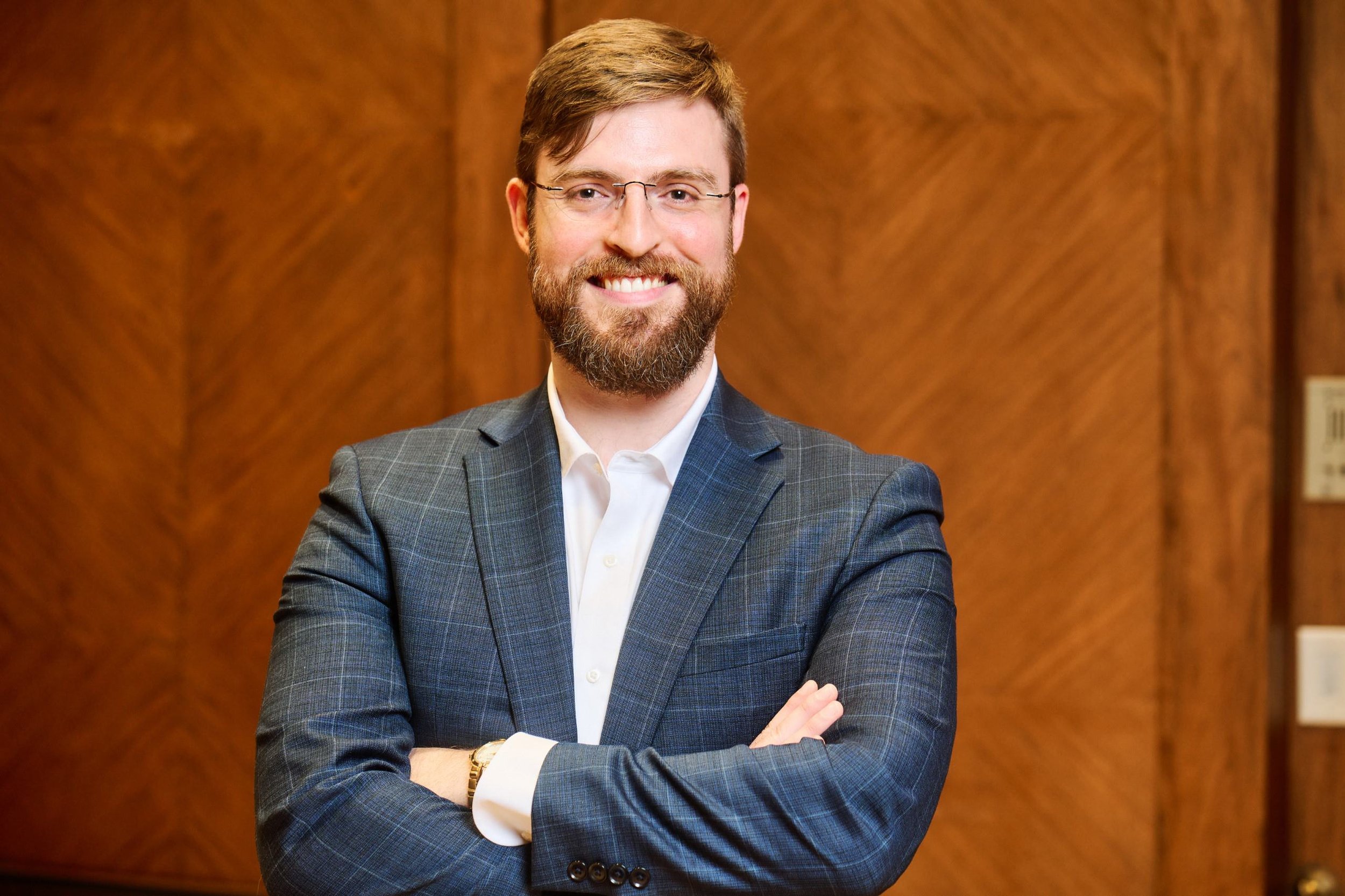
“‘Music of the Earth’ is a macro-theme that is close to my heart,” says Nick DiBerardino (Composition ’18), Ensemble 20/21 director, acclaimed composer, chair of composition studies, and dean of Curtis. “I chose it in part to participate in Curtis’s All-School Project, an initiative that we like to think of as an “extravaganza” of interdepartmental collaboration. In my view, it is an especially potent theme because of the way it highlights music’s ability to connect each of us to our communities, spaces, places, and the broader culture and environments around us. It also offers an exciting opportunity to program music by composers who are championing the work of environmental justice, bringing their creativity to bear on one of the most pressing issues we face.
“This year’s “Music of the Earth” program comes close on the heels of a similarly themed Ensemble 20/21 concert last year. In that first concert, we highlighted works by Jerod Impichchaachaaha’ Tate, Kaija Saariaho, Gabriela Lena Frank, Tania León, and Olivier Messiaen. I’m glad this season’s concert will build on that cross-section of composers concerned with the natural world.”
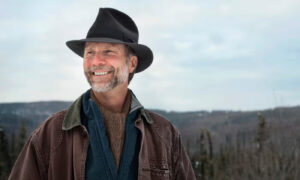
The concert opens with American “Eco-composer” and full-time climate activist John Luther Adams’s Three High Places. Written in memory of his dear friend and lifelong camping buddy Gordon Wright, this breathtaking solo work for violin or cello evokes the Alaskan wilderness’s vast, untamed beauty and rugged terrain. These poignant musical sketches encapsulate three moments and places throughout Adams and Wright’s thirty-year camaraderie. With clear, resonant sounds produced as natural harmonics or on open strings, this introspective piece transports the listener to a quiet pass in the Sadelerochit Mountains, then high above on a wind-whipped summit, and finally, looking out across the waters of Turnagain Arm toward the Resurrection Valley and the tiny settlement of Hope.
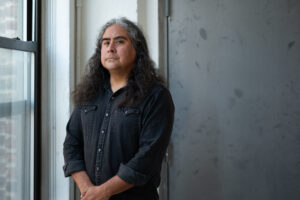 Pulitzer Prize-winning composer Raven Chacon’s haunting string quartet piece, The Journey of the Horizontal People, is “an alternate universe creation story” with people dispersing from one place and traveling west to east to expand their worldview, diversify their philosophy or follow their genetic destiny, as they search for another group of people like them to survive. Throughout their journey, which the score stipulates must be led by a woman in the quartet (alternative solutions include featuring the eldest performer or female-identifying member in the ensemble) to highlight the matriarchal worldview of native traditions, these “horizontal people” ultimately discover they are the individuals they have been searching for all along.
Pulitzer Prize-winning composer Raven Chacon’s haunting string quartet piece, The Journey of the Horizontal People, is “an alternate universe creation story” with people dispersing from one place and traveling west to east to expand their worldview, diversify their philosophy or follow their genetic destiny, as they search for another group of people like them to survive. Throughout their journey, which the score stipulates must be led by a woman in the quartet (alternative solutions include featuring the eldest performer or female-identifying member in the ensemble) to highlight the matriarchal worldview of native traditions, these “horizontal people” ultimately discover they are the individuals they have been searching for all along.
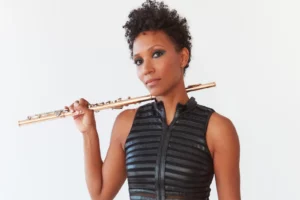 The program continues with “powerhouse” (Washington Post) flutist and composer Allison Loggins-Hull’s Homeland. Written shortly after Hurricane Maria wreaked havoc throughout Puerto Rico in 2017 and composed as a response to the political and social unrest in the United States and Syria, this poignant, thought-provoking work for solo flute is a musical interpretation of what the word “home” means when the land has been destroyed. Concluding with a unique arrangement of “The Star-Spangled Banner,” it explores the definition of “home” during a political or human crisis. The work also highlights the unraveling of patriotism when individuals do not feel welcome in their own city.
The program continues with “powerhouse” (Washington Post) flutist and composer Allison Loggins-Hull’s Homeland. Written shortly after Hurricane Maria wreaked havoc throughout Puerto Rico in 2017 and composed as a response to the political and social unrest in the United States and Syria, this poignant, thought-provoking work for solo flute is a musical interpretation of what the word “home” means when the land has been destroyed. Concluding with a unique arrangement of “The Star-Spangled Banner,” it explores the definition of “home” during a political or human crisis. The work also highlights the unraveling of patriotism when individuals do not feel welcome in their own city.
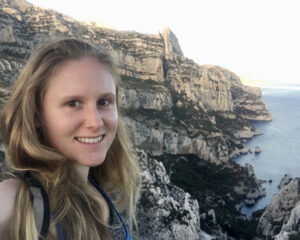 The first half of the program concludes with Curtis composition alumna and ecological activist Gabriella Smith’s (’13) imaginative Anthozoa for violin, cello, piano, and percussion. Inspired by recordings that the composer made while scuba diving and named after the class of marine invertebrates that encompass sea anemones and coral), this colorful work features a prepared piano, sliding pizzicato cello, unpitched strikes on the violin, and a lively and inventive array of percussive found instruments which evoke the spectacular marine life of the coral reefs of French Polynesia.
The first half of the program concludes with Curtis composition alumna and ecological activist Gabriella Smith’s (’13) imaginative Anthozoa for violin, cello, piano, and percussion. Inspired by recordings that the composer made while scuba diving and named after the class of marine invertebrates that encompass sea anemones and coral), this colorful work features a prepared piano, sliding pizzicato cello, unpitched strikes on the violin, and a lively and inventive array of percussive found instruments which evoke the spectacular marine life of the coral reefs of French Polynesia.
 Gulli Björnsson’s meditative set of pieces for solo acoustic guitar, Landslög, draws its inspiration from the ice fields, soaring mountains, and volcanic peaks, bays, and fjords of the Icelandic guitarist and composer’s homeland. These thematically unconnected pieces feature repetitive patterns that become increasingly more challenging as they progress, unified only through the similar aesthetics and musical concepts they display. The performance, featuring selections from the entire work, will be accompanied by striking visual material created by Björnsson by processing various images and stock videos put together through pixel processing and interactive shaders in the unique visual programming language, Max, designed for music and multimedia.
Gulli Björnsson’s meditative set of pieces for solo acoustic guitar, Landslög, draws its inspiration from the ice fields, soaring mountains, and volcanic peaks, bays, and fjords of the Icelandic guitarist and composer’s homeland. These thematically unconnected pieces feature repetitive patterns that become increasingly more challenging as they progress, unified only through the similar aesthetics and musical concepts they display. The performance, featuring selections from the entire work, will be accompanied by striking visual material created by Björnsson by processing various images and stock videos put together through pixel processing and interactive shaders in the unique visual programming language, Max, designed for music and multimedia.
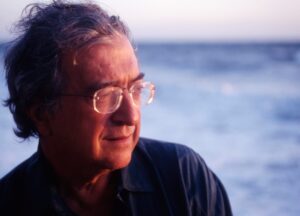
The concert closes with pioneering electronic music composer Luciano Berio’s 1964 anthology of eleven songs from eight countries, Folk Songs, for voice and chamber ensemble, featuring mezzo-soprano Micah Gleason, who will be conducting and singing from the podium. Written during his residency at Mills College for then-wife, mezzo-soprano Cathy Berberian, a barrier-breaking innovator in contemporary vocality, the cycle recomposes traditional tunes and lyrics from America, Armenia, Auvergne, Azerbaijan, France, Italy, Sardinia, and Sicily, interpreting them in a new rhythmic and harmonic light. From “Black is the Color” and “I Wonder as I Wander” by classically trained singer and folklorist John Jacob Niles to traditional Italian songs and an Armenian piece that harkens back to Berberian’s Armenian roots, this complex and remarkably creative collection combines a modernist classical music aesthetic with folk idioms resulting in a cycle that is as challenging as it is readily accessible. Folk Songs features atmospheric lighting for each of the eleven songs of the cycle, courtesy of Philadelphia-based lighting designer Tydell Williams.
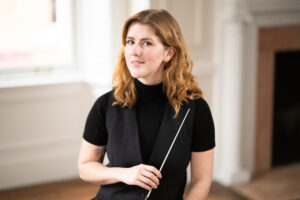 Flexible in size and scope, Ensemble 20/21 performs a wide range of music from the 20th and 21st centuries, including works by Curtis students and alumni. The ensemble has appeared at major U.S. venues such as the Kennedy Center, Carnegie Hall, and the Miller Theatre, as well as international venues. The ensemble has also presented concert portraits of iconic composers in residence Tania León, Alvin Singleton, Unsuk Chin, John Corigliano, George Crumb, Krzysztof Penderecki, and Chen Yi, among many others.
Flexible in size and scope, Ensemble 20/21 performs a wide range of music from the 20th and 21st centuries, including works by Curtis students and alumni. The ensemble has appeared at major U.S. venues such as the Kennedy Center, Carnegie Hall, and the Miller Theatre, as well as international venues. The ensemble has also presented concert portraits of iconic composers in residence Tania León, Alvin Singleton, Unsuk Chin, John Corigliano, George Crumb, Krzysztof Penderecki, and Chen Yi, among many others.
Ensemble 20/21’s 2023–24 season continues Saturday, March 30, 2024, at 7:30 p.m. with “Intersection,” featuring music by composers who explore the terrain between traditional genre boundaries. It concludes on Saturday, April 13, 2024, at 7:30 p.m. with a “Portrait of George Lewis,” featuring works by the award-winning composer, musicologist, author, computer-installation artist, trombonist, and Curtis’s 2023–24 composer in residence. Both performances will be held in Gould Rehearsal Hall on the Curtis campus. Visit Curtis.edu/Calendar to view Curtis’s entire season of performances and events.
Ticketing Information
This concert is currently sold out. You may join the waitlist should seats become available at Curtis.edu. Subscriptions for Curtis’s 2023–24 season are on sale now. The flexible Choose Your Own subscription option offers 25% off ticket prices when purchasing tickets to two or more performances. For the 2023–24 season, Curtis is also offering a Season Pass, with access to all remaining performances in the 2023–24 season for one low rate of $179. Each Season Pass is valid for one best-available ticket to each paid season performance. To order a subscription, visit Curtis.edu/Subscribe, call (215) 893-7902, or email tickets@curtis.edu.
About the Curtis Institute of Music
At Curtis, the world’s most talented young musicians develop into exceptional artists, creators, and innovators. With a tuition-free foundation, Curtis is a unique environment for teaching and learning. A small school by design, students realize their artistic potential through intensive, individualized study with the most renowned, sought-after faculty. Animated by a learn-by-doing philosophy, Curtis students share their music with audiences through more than 100 performances each year, including solo and chamber recitals, orchestral concerts, and opera—all free or at an affordable cost—offering audiences unique opportunities to participate in pivotal moments in these young musicians’ careers. Curtis students experience a close connection to the greatest artists and organizations in classical music, and innovative initiatives that integrate new technologies and encourage entrepreneurship—all within a historic campus in the heart of culturally rich Philadelphia. In this diverse, collaborative community, Curtis’s extraordinary artists challenge, support, and inspire one another—continuing an unparalleled 100-year legacy of musicians who have led, and will lead, classical music into a thriving, equitable, and multidimensional future. Learn more at Curtis.edu.
ENSEMBLE 20/21
Music of the Earth
Saturday, November 18, 2023, at 7:30 p.m.
Gould Rehearsal Hall, Curtis Institute of Music, 1616 Locust Street, Philadelphia
Micah Gleason, Rita E. Hauser Conducting Fellow
PROGRAM
| JOHN LUTHER ADAMS | Three High Places | |
| RAVEN CHACON | The Journey of the Horizontal People | |
| ALLISON LOGGINS-HULL | Homeland | |
| GABRIELLA SMITH (’13) | Anthozoa | |
| —Intermission— | ||
| GULLI BJÖRNSSON | Landslög | |
| LUCIANO BERIO | Folks Songs |
Generous support for Ensemble 20/21 is provided by the Daniel W. Dietrich II Foundation.
Portrait of Roberto Díaz by Charles Grove. Photo of Nick DiBerardino courtesy of the Curtis Institute of Music. Photo of John Luther Adams by Don Lee. Photo of Raven Chacon courtesy of John D. and Catherine T. MacArthur Foundation. Photo of Allison Loggins-Hull by Rafael Rios. Photos of Gabriella Smith and Gulli Björnsson courtesy of each artist’s official website. Photo of Luciano Berio by Marina Berio. Portrait of Micah Gleason courtesy of Nichole MCH Photography.
# # #


